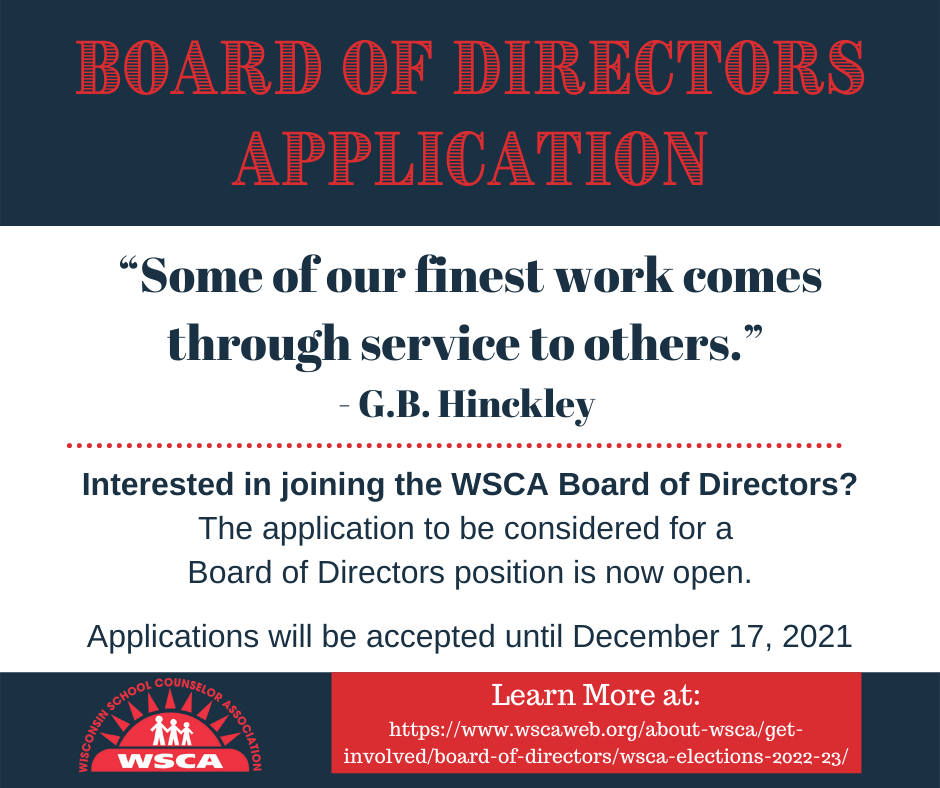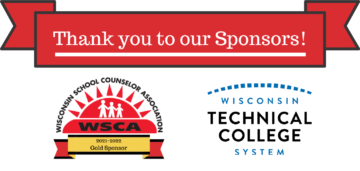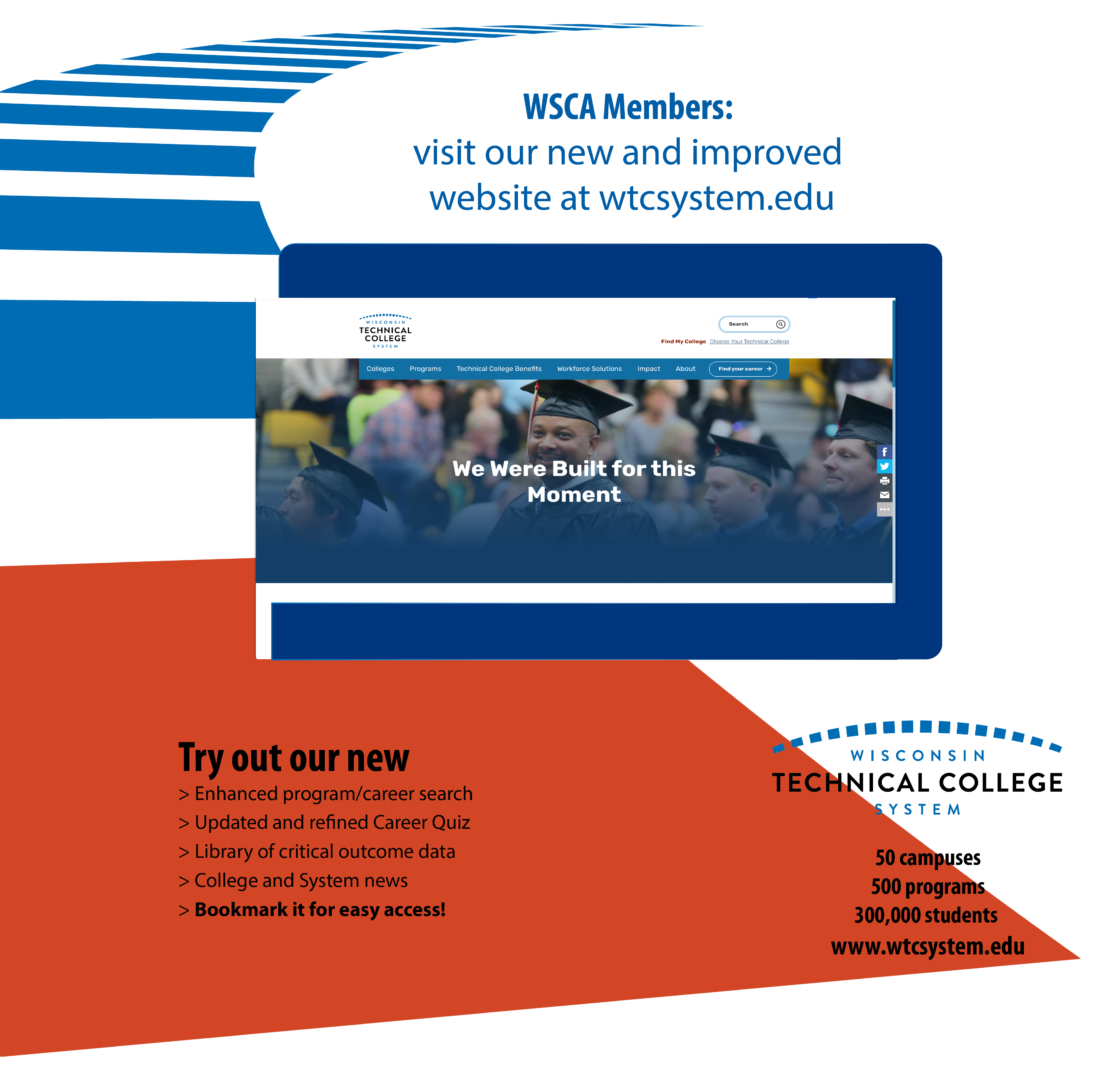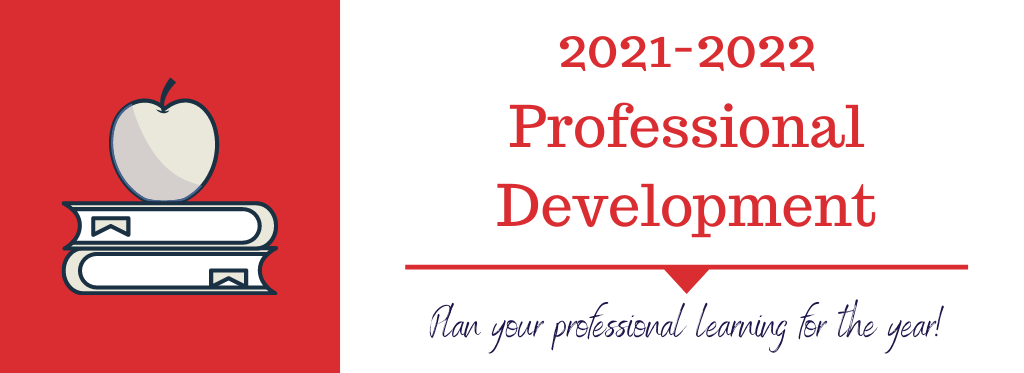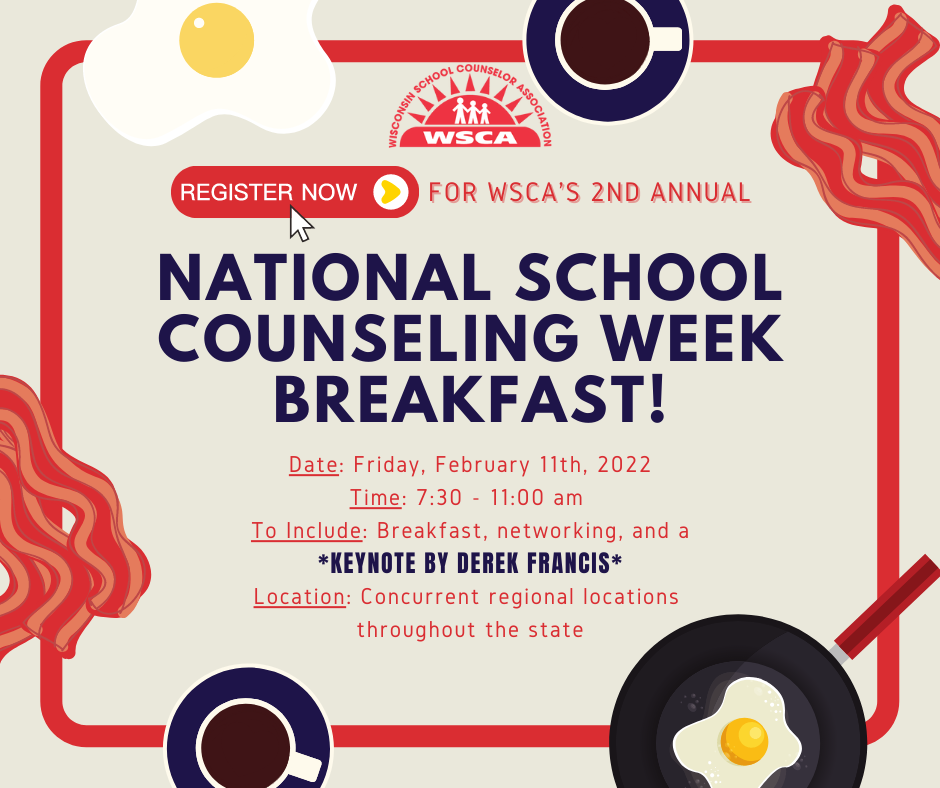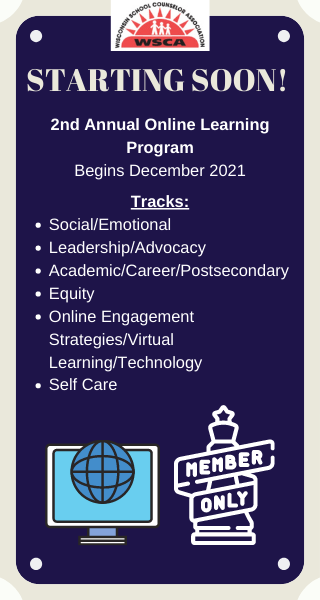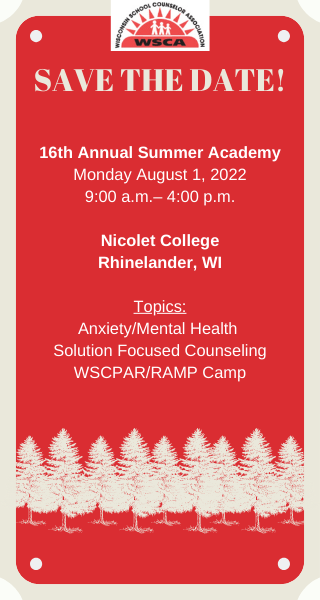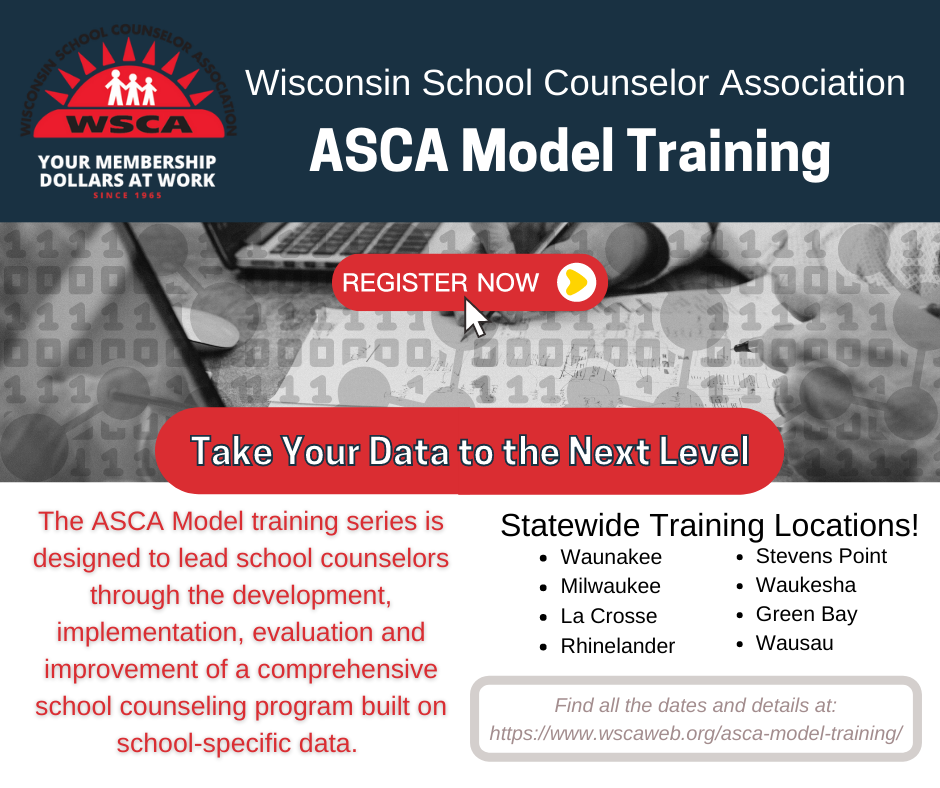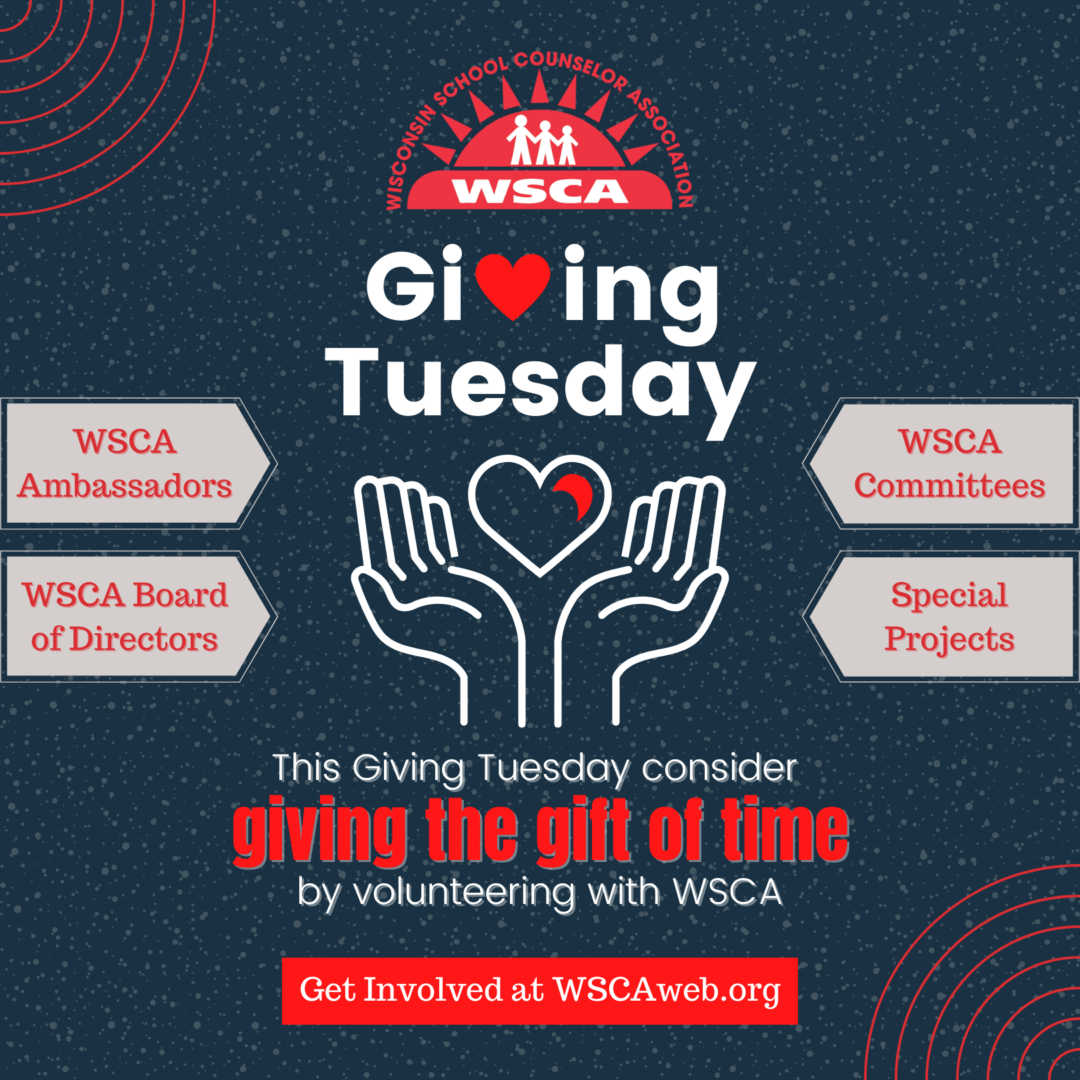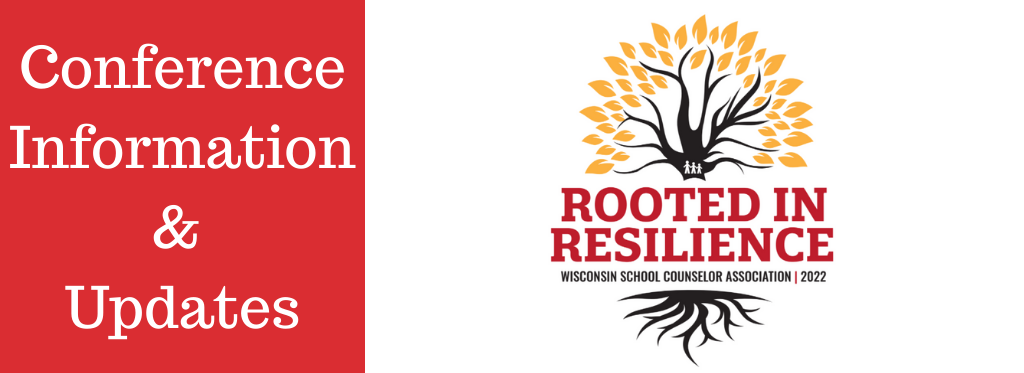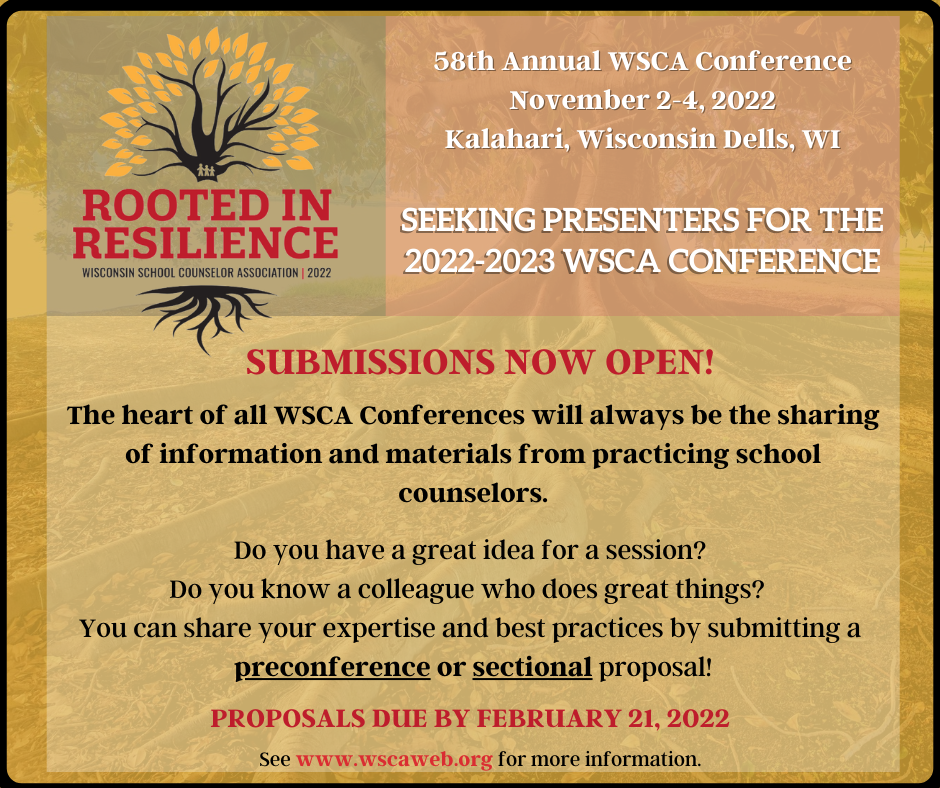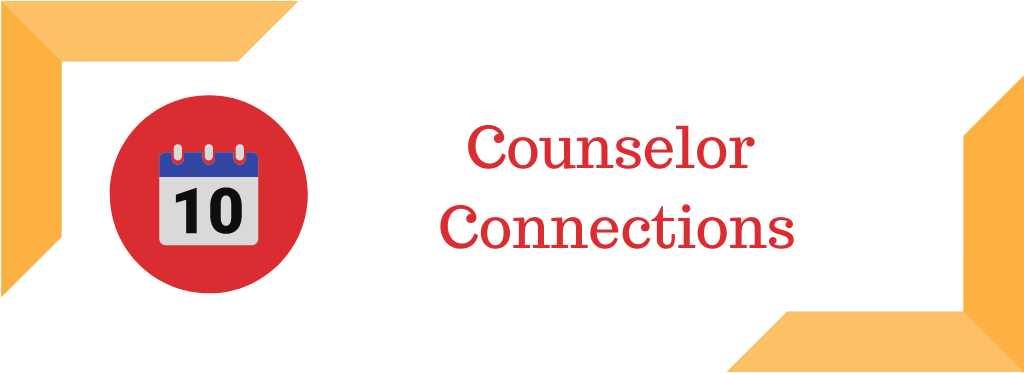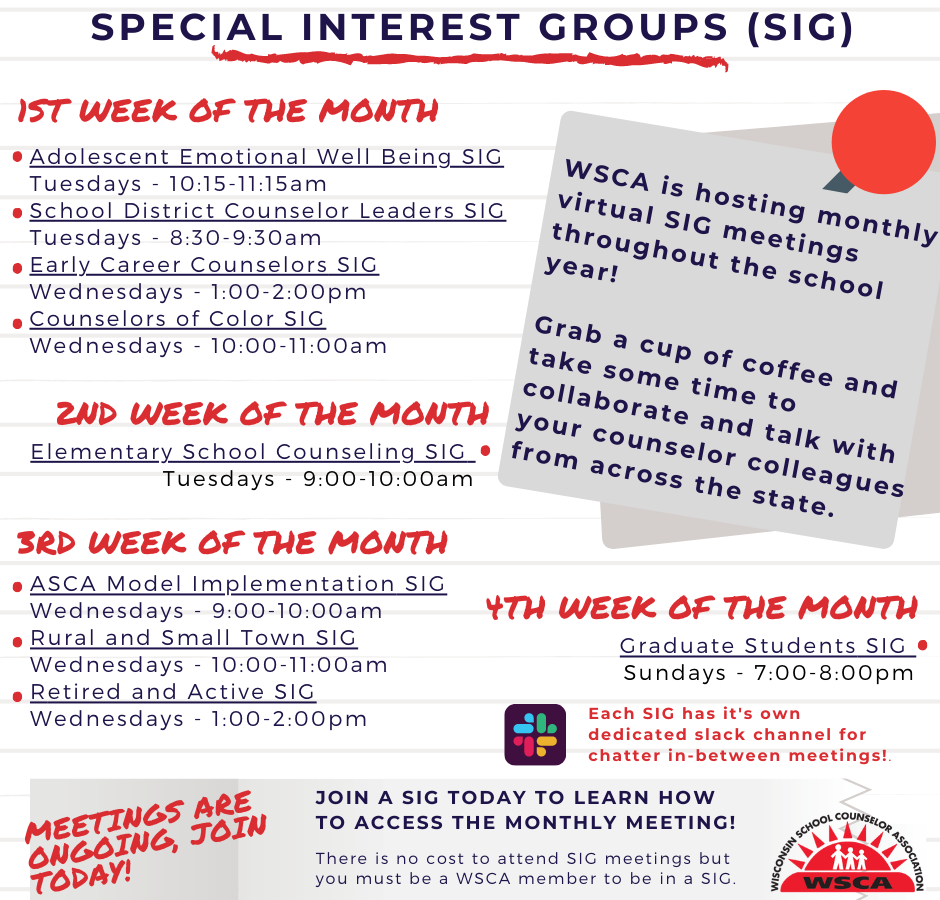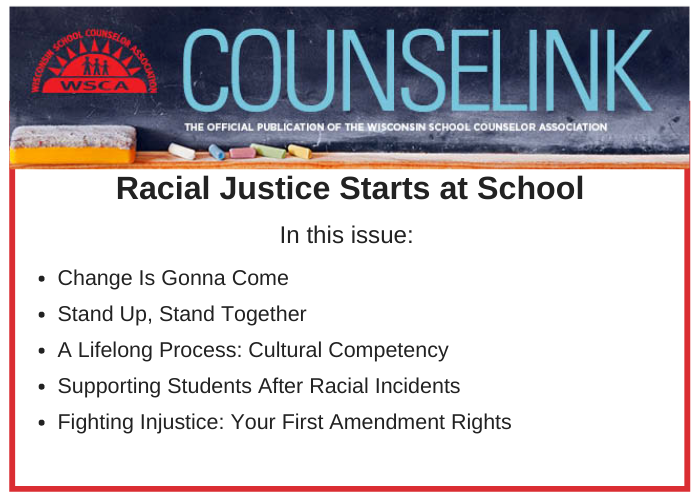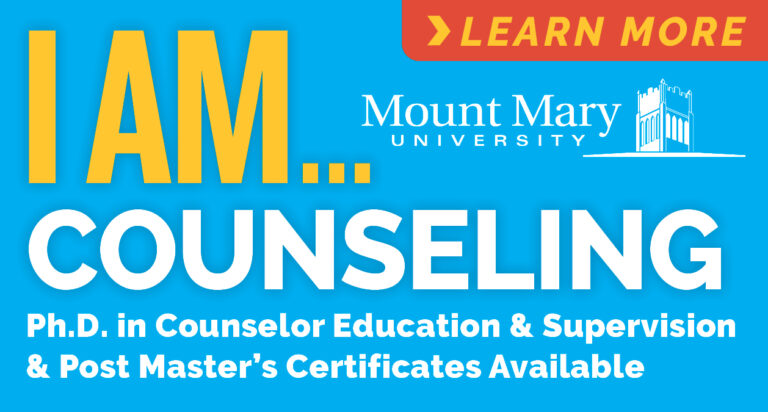December 2021

Table of Contents
A Message from the WSCA Executive Director

The Power of Gratitude
It was wonderful to see so many of you at our conference in November at the Kalahari! We are looking forward to connecting with you all again at our regional NSCW breakfast events on Friday February 11th with keynote speaker, Derek Francis.
I recently wrote about how the only way is through when thinking about the challenges, stress and struggles of COVID that impacts every part of our lives. So the question now is how do we make it through?
I recently came across the Greater Good Science Center (GGSC) out of UC Berkeley and found an amazing resource that was created for the nursing profession centered on gratitude. The GGSC and the American Nurses Foundation created a Gratitude Practice for Nurses, Toolkit for Well-Being that include small, manageable, evidence based things that can be done to make front line practitioners feel better and build resilience. These activities may be helpful for you, but I also see many of you seeking ways to support your staff. There are things in the toolkit that you may also be able to use with your teachers and/or students. I know many of you are already doing these things but it is a great consolidation of resources that may be one of the steps in how we get through this together. You can learn more about the project here https://ggsc.berkeley.edu/gratitudefornurses,
Please join us in our efforts to utilize gratitude to make it through the rest of this year.
~Stacy
A Message from the WSCA Board of Directors

This year’s WSCA Conference was the first I’ve attended as a Board Director. What a privilege it was to be able to share space and ideas with other counselors from around the state again! Our primary role as the WSCA Board is to provide linkage between our members and the WSCA organization, so I was really looking forward to our member listening session during the conference. Our goal during the Board listening sessions is to hear from school counselors from across the state about issues that our members are experiencing. While our time together over the Thursday lunch hour was brief, it was also enlightening.
We all know school counselors face innumerable challenges every school year, but especially now. Our attendees specifically shared that in the midst of the ongoing pandemic they are also grappling with staff shortages, large caseloads, and confusion about the role of the counselor. We heard that administrators especially could benefit from clearer definitions of our role, and our guests suggested that perhaps WSCA could provide resources for educating stakeholders about the school counselor role.
WSCA recognizes the critical importance of ongoing equity focus in our organization. Equity work is never easy, but we heard that some counselors are facing even more barriers than most. In some parts of the state, counselors are prohibited from talking about equity work and report having to be extremely conscious of how they speak about any issues related to race. While some counselors feel safe starting conversations around equity at their schools, others are terrified to explicitly discuss it in the context of their school community’s climate. Wisconsin communities fall on a huge spectrum of readiness when it comes to addressing racism in schools.
A huge thank you to those who took time to share your day-to-day experiences as a counselor with us in the listening session! We hope to hear from more of you next year at the WSCA conference in November of 2022 with another fitting theme for the work we do: Rooted in Resilience. Our organization is committed to meeting your needs as members and we love having the opportunity to connect. We would also like to encourage you, our members, to consider offering your leadership as a WSCA Board Director! We are currently seeking Board of Director candidates to represent the diverse needs and perspectives of all Wisconsin school counselors. More information on becoming a Board Director can be found at this link.
~Carly Roth
2021-2022 Professional Recognition Winner Highlight
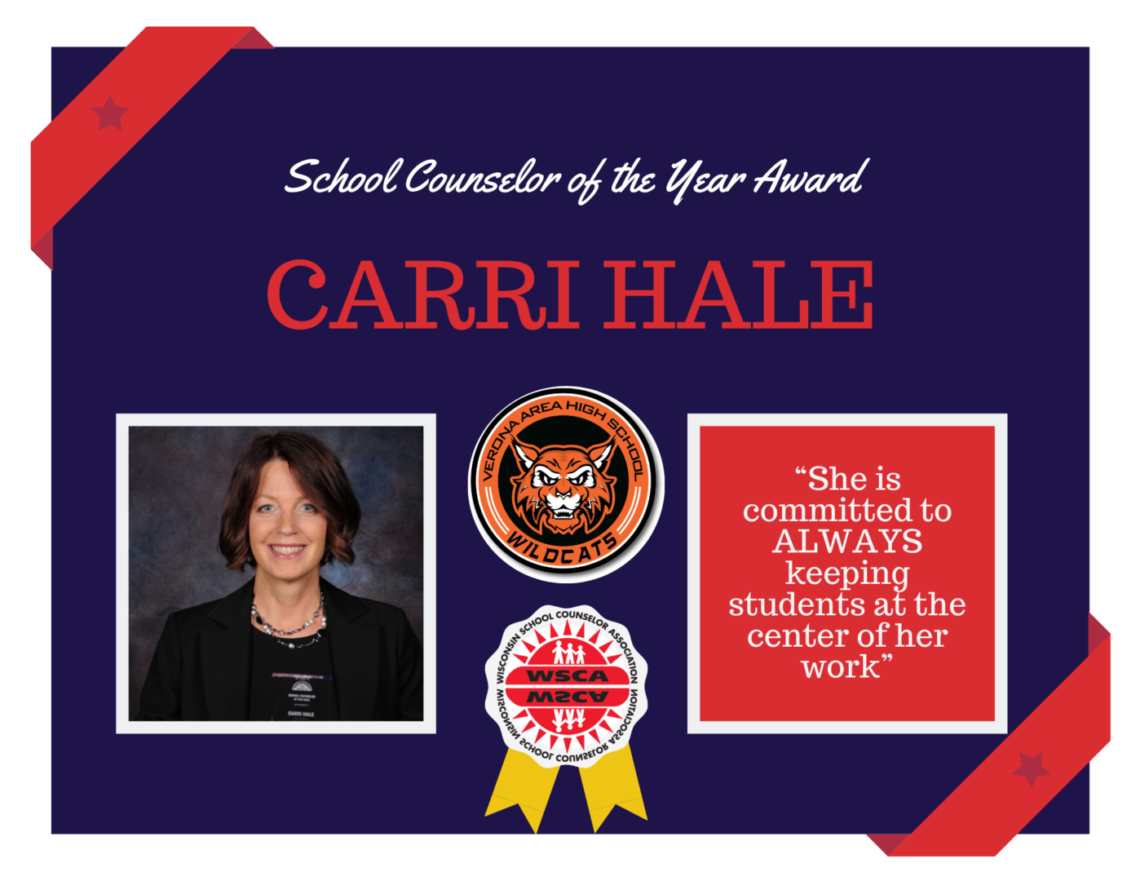
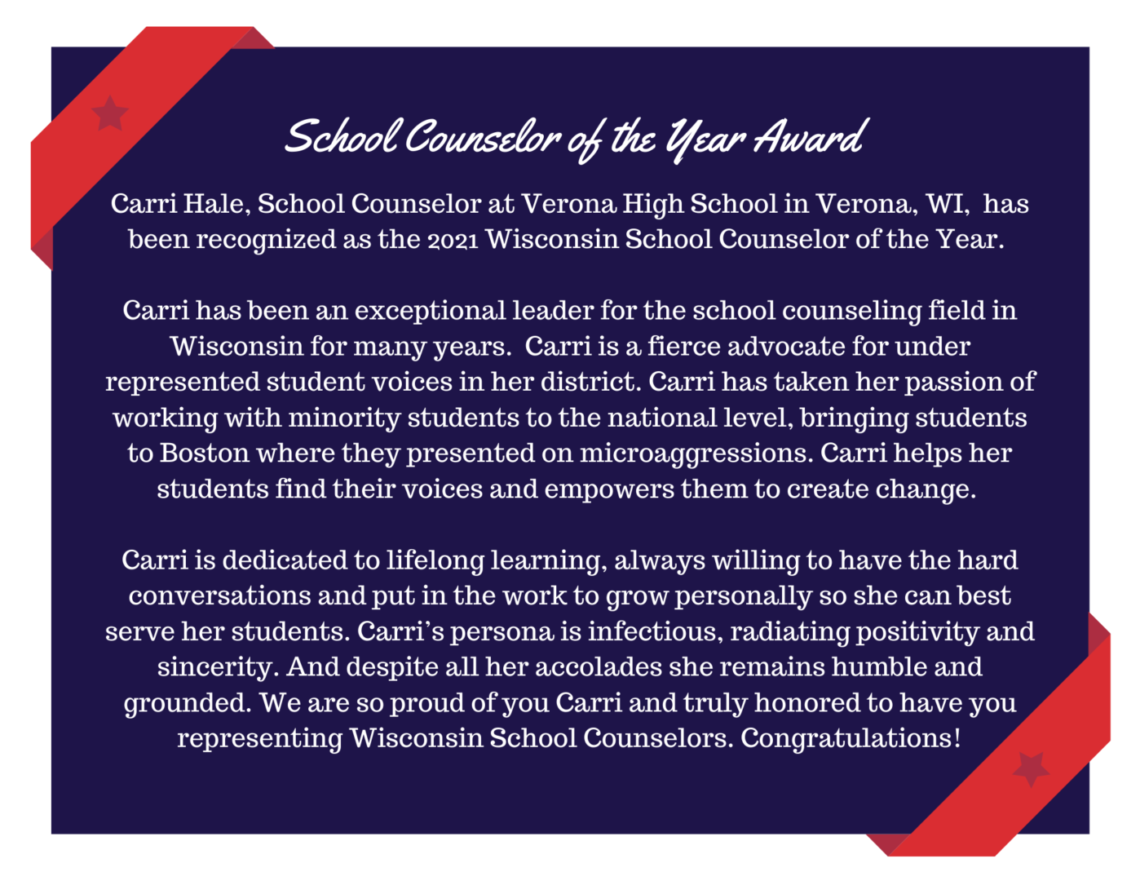

A Message from the Department of Public Instruction
NEW! Wisconsin School Mental Health Framework: Building and Sustaining a Comprehensive System
Andrea Donegan, DPI School Counseling Consultant shared the following resource recently:
DPI has released an update to the Wisconsin School Mental Health Framework. This framework presents a comprehensive approach to mental health work in schools, which integrates mental health supports into the Equitable Multilevel System of Supports. A Comprehensive school mental health system (CSMHS) includes a continuum of services and supports to promote student and staff mental health by fostering social and emotional wellbeing and positive school culture, and eliminating systemic barriers to wellbeing and success for all students. A CSMHS increases health equity by ensuring all students and staff have access to the prevention, early intervention, and treatment supports that they need, when they need them, free of stigma. Wisconsin’s framework outlines six components of a CSMHS and provides guidance on implementing them from a trauma sensitive lens.
Looking for implementation support? Check out DPI’s mental health website and keep an eye out for the Wisconsin Comprehensive School Mental Health Toolkit, coming soon.

Feature Article – Meaningful Career Conversations
Meaningful Career Conversations
Mia Tatum-Crider
Glen Hills Middle School
Since November is Career Development Month, I know we may have spent some time focusing specifically on exposing our students to careers to explore, create and plan for their futures. I want to discuss a few things to consider as we have career conversations with students, families, and all in our school community. We empower our students to explore their interests, abilities, values and goals and ask them to envision themselves in the career they want. How can we ask students to envision themselves in a career where there is little or no representation of someone that looks like them? As we do provide students with tools and new knowledge to help them realize the many possibilities available to them in the workforce, we must also actively engage them in meaningful and impactful activities!
Research shows that our K-12 educational systems often do not sufficiently prepare marginalized students to be successful within the future workforce. We can provide our students with school counseling services and support that can disrupt this. I ask students “what impact do you want to make on your community or in the world?” and this question encourages them to really think about their future and how they see themselves in the future.
We can provide a more meaningful experience to our students by allowing them to speak to professionals in the career field they want to pursue. The pandemic changed our plans for an in person career day drastically but it provided me with the opportunity to try my new program called Career Pen Pals. It connects our students to a community business partner; alumni of our school (or partner high school) and they have virtual discussions two or three times. This allows students to be excited and engaged in meaningful conversations with someone employed in a career they want. There are a variety of diverse careers and people from within our own community who at one time or another walked the same school hallways and sat in the same seats as our students do now. They can envision themselves pursuing their goals just as their Pen Pal has done.
School counselors must be attuned to how the many other factors may influence our youth as they explore careers. We do not minimize their career aspirations or use language that may deter or diminish their true desire to pursue their dreams. In a world of many continued ‘firsts’ (i.e. the first African American female NFL football coach to the first transgender person to be elected to senate) let’s continue to support, encourage and empower all of our students to become whatever they want to be in the world of work! We can help lead our students on their journey to reaching their aspirations and making a positive impact on everyone around them. You are appreciated, continue to be the greatest resource for good!
ASCA has free Career Conversation Starters available for download: https://www.schoolcounselor.org/Publications-Research/Publications/Free-ASCA-Resources/Career-Conversation-Starters
You Spoke, We Listened
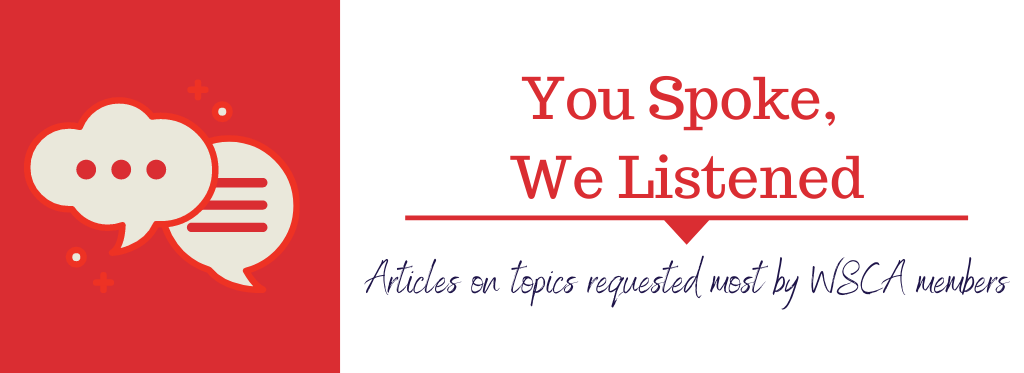
![]()
How The Perkins CLAN Could Assist in Access to Equitable Education
Some of you may not be aware that major revisions were made to federal Carl Perkins funding a few years ago. Schools are now required to complete a comprehensive local needs assessment (CLAN) which is very similar to what school counselors do when completing a data review and writing closing the gap plans when implementing comprehensive school counseling programs. This would be a great opportunity for you to collaborate and partner with educators in your schools to address systemic access to equitable education opportunities.
An overview of the Perkins CLAN can be found here: https://dpi.wi.gov/cte/grants-events/perkins-v-grant-supports-equity-action
Additional equity resources shared from DPI supporting CTE can be found here: https://dpi.wi.gov/sites/default/files/imce/cte/CPA/2019_09_Online_Equity_Resources.pdf
Save the Date for an Equity Focused Keynote at WSCA’s NSCW Breakfast Event!
Looking for your mid-year connection with counselors from across the state? Want to hear more from Derek Francis? Attend our National School Counseling Week Breakfast 2022 on February 11th.
![]()
FREE Educator and Caregiver Compassion Fatigue and Burnout Learning Series
Provided by Marshfield Clinic Health System Psychiatry & Behavioral Health Department
In partnership with the Wisconsin Department of Administration Beyond the Classroom Grant Program
Compassion fatigue and burnout is sweeping the nation and none of us are immune. That is why it is important to identify the signs of stress and burnout and learn tools and strategies to increase resilience through the ongoing adversities faced by educators, caregivers and adults who work with children and youth. This learning series provides an overview of compassion fatigue and burnout experienced by adults as they support children and adolescents through the endemic. The series will highlight how daily work stress is impacting educator and caregiver mental health and well-being. We will define compassion fatigue and burnout, identify early signs of burnout, become aware of risk factors and protective factors, and discuss realistic action steps towards building compassion resilience. Following the webinar, educators, caregivers and adults who work with children and youth will be able to identify and implement self-care strategies and tools into their daily work to facilitate personal and team well-being.
Join us for the following learning series
December 3 – The Mental Health Impact of the Pandemic: Risk Factors, Stress Monitoring, and the Imperative for Intentional Self-Care (11:00-12:00 pm via WebEx)
Presented by Jennifer Michels, PhD ABPP – Clinical Psychologist, Marshfield Clinic Health System
December 17 – Compassion Fatigue and Children & Youth Support Strategies (11:00-12:00 pm via WebEx)
Presented by Kelly Spanier, PsyD – Psychology Postdoctoral Fellow, Marshfield Clinic Health System
January 7 – Stress and Anxiety Management: Strategies that Work (11:00-12:00 pm via WebEx)
Presented by Kelly Spanier, PsyD – Psychology Postdoctoral Fellow, Marshfield Clinic Health System and Kelsie Offenwanger, PsyD – Child/Adolescent Psychologist, Marshfield Clinic Health System
January 21 – Personal Resilience and Well-Being: Fostering Growth Through the Pandemic (11:00-12:00 pm via WebEx)
Presented by Kelsie Offenwanger, PsyD – Child/Adolescent Psychologist, Marshfield Clinic Health System
The learning series will be recorded and will be available on the Wisconsin Afterschool Network Website. If you are unable to attend any of the learning series sessions you can still participate and will receive a recording link.
![]()
Technical Education is a Gift That Keeps Giving
As we move closer to the holidays and become fixated on the ritual of giving, consider encouraging young people – specifically in the importance of self-care. Perhaps this includes helping them see self-care as an investment in themselves. As a practical matter – to help them grow and achieve their dreams, rather than “what’s expected” or “what everyone does.”
One of the many benefits of a technical college education is that it is affordable – at least relatively. Tuition can be more affordable than most higher education options by half as much or three-quarters, both in terms of finances and time. And yet, the gains that one may realize from a two-year degree or less are tremendous and continue to grow. The time spent at a technical college provides a focused, real-world education that directly applies to a degree or a transfer path to another institution.
There is the most quantifiable return on investment, a potential increase in job status which often includes a pay bump. There is also a sense of satisfaction that comes with accomplishing something you’ve set out to do. Particularly if you are working or have a family, which many of our students have, especially non-traditional students. This must not be overlooked – each credential a student earns is a tremendous accomplishment, especially with so many distractions at any given time. Third, there is pride one gets from learning, growing and challenging yourself. Something students most certainly will experience at a technical college is recognition from instructors, who not only know them, but who recognize and appreciate they put in the work.
Another thing potential students must know is that the technical colleges do not just provide academic support, they provide all kinds of other support services too. All 16 of Wisconsin’s technical colleges provide some or all:
- Emergency funding when issues arise, for example, in the event of transportation problems keeping them from attending
- A food pantry, realizing hungry students, or students with hungry children, are less successful students
- Childcare, so parents of young children can focus on their goals when they are in school
- Technology services, so even the most rural students can be assured they have access to a laptop and/or wi-fi service
- Tutors and academic support – no student will be turned away because they may need help catching up on math or English skills, for example
- Scholarships and financial aid – an often-misunderstood fact about technical colleges is that students are ineligible for financial aid or scholarships. Most programs are eligible for financial aid, and there are many programs and employer-partnerships that help provide student support
- Student support groups, counseling support, student lounges and study space
- Job placement assistance
- On-campus health services
Technical colleges provide experiences for students that are difficult to quantify but that round out their education and make the experience more valuable with growth opportunities, like:
- Study abroad opportunities
- Intramural and or college sports
- Honor societies
- Drama, journalism and arts programs
- Student government
- Leadership development activities
- Professional groups and clubs
It’s true that technical college does not always make it as far as the student/parent’s consideration set, but it really should be considering a technical college education is more portable than ever and doesn’t preclude students from continuing to a four-year institution. A four-year degree shouldn’t always be the goal once students see how much they get from attending a technical college. Especially when they know the benefits gained from earning a short-term certificate, technical diploma or Associate degree at a technical college. Visit www.WTCSystem.edu for more information on Wisconsin’s 16 technical colleges.
Legislative Updates
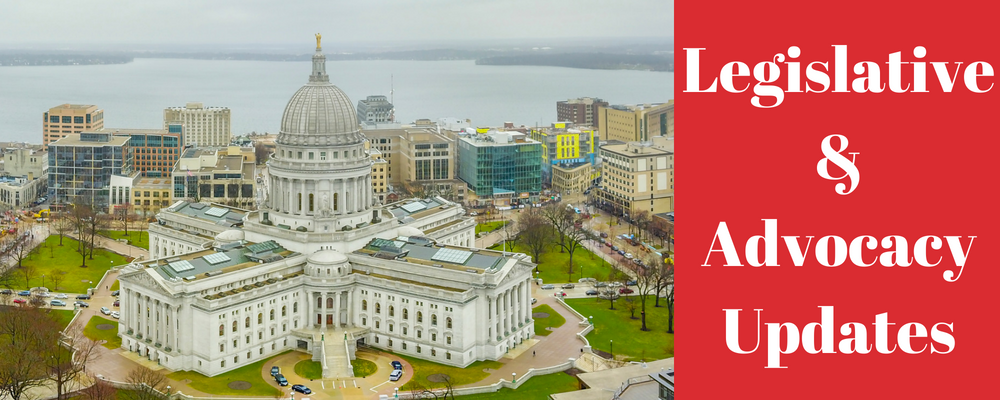
WSCA Presented to Wisconsin Children’s Legislative Caucus

Stacy Eslick (WSCA Executive Director), Sarah Flier (WSCA WSCPAR & ASCA Model Director/2021 ASCA School Counselor of the Year Finalist), and Kelly O’Connell (WSCA Advocacy & Government Relations Director) were invited to speak to the Wisconsin Children’s Legislative Caucus on November 16th to discuss the impact COVID has had on students as well as overall children’s mental health. Many of the participants were not aware of the role that school counselors provide in schools supporting students’ social/emotional well being. The feedback and questions we received were extremely supportive of the work counselors are doing in schools to support students. The presentation can be found here.
The Legislative Children’s Caucus is a bipartisan, bicameral caucus co-chaired by Representative Jill Billings, Representative Patrick Snyder, Senator Alberta Darling, and Senator LaTonya Johnson. The purpose of the caucus is to cultivate a legislature dedicated to advancing promising, evidence-informed public policy that improves the life of every Wisconsin child, from the prenatal stages through age 18. The caucus was founded in 2015 in a joint effort to create a sustainable forum to educate legislators and build bipartisan support for promising, evidence-informed investments in children and families.
Update from the Wisconsin School Administrator Alliance (SAA) on Critical Race Theory Bill
Senate Committee Recommends Passage of CRT Bill
By John Forester | November 30, 2021
The Senate Education Committee voted along party lines yesterday to advance legislation that proponents say would ban the teaching of critical race theory in K-12 schools.
The committee voted via paper ballot 4-3 to advance SB 411 and AB 411. All Republicans on the committee supported the bills, while all Democrats were opposed.
AB 411 cleared the Assembly in September. The legislation prohibits race or sex stereotyping in 1) instruction provided to pupils; 2) training provided to school employees. The bill provides for the withholding of up to 10% of state aid and allows for parents/guardians to bring legal claims against districts for violations. It also requires school boards to post all curricula used in the district and provide a printed copy of curriculum at no cost to the requester. The SAA strongly opposes this legislation.
On October 4th, the SAA posted the complete testimony of Representative Chuck Wichgers (R-Muskego) on Assembly Bill 411. Representative Wichgers is the Assembly author of the bill. I forwarded his testimony simply to give SAA members a little taste of the current political environment inside the Capitol. At that time, I recommended that SAA members pay particular attention to the addendum to Representative Wichgers testimony in which he lists about 80 terms that, in his estimation, educators could no longer discuss in class if this bill were to become law. If you haven’t already done so, I urge you to check it out.
Stay tuned. We will keep you apprised of any developments on this issue.



